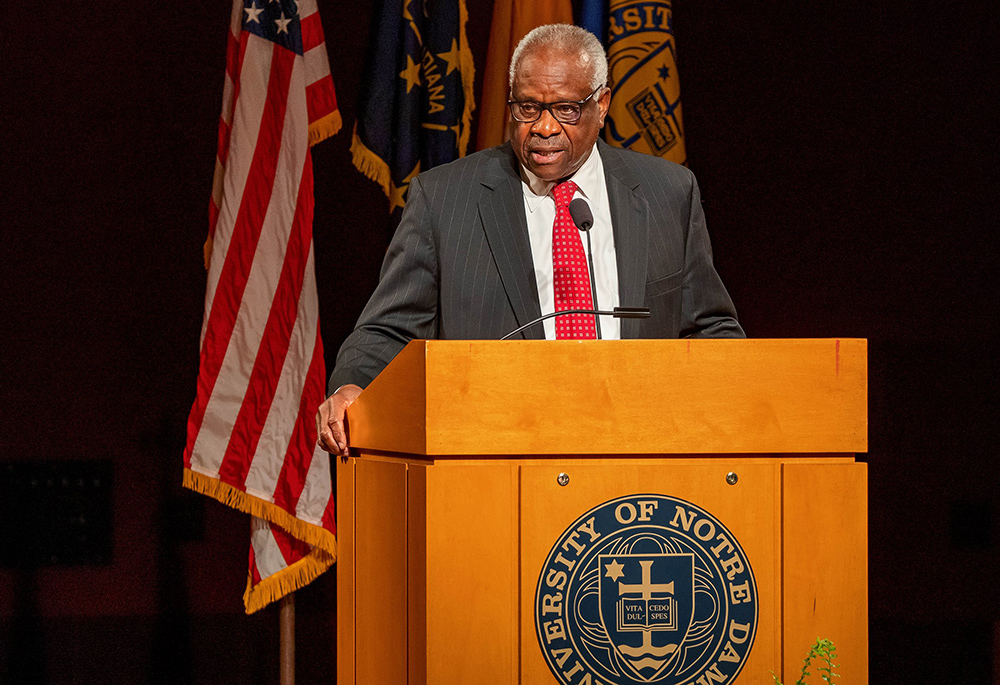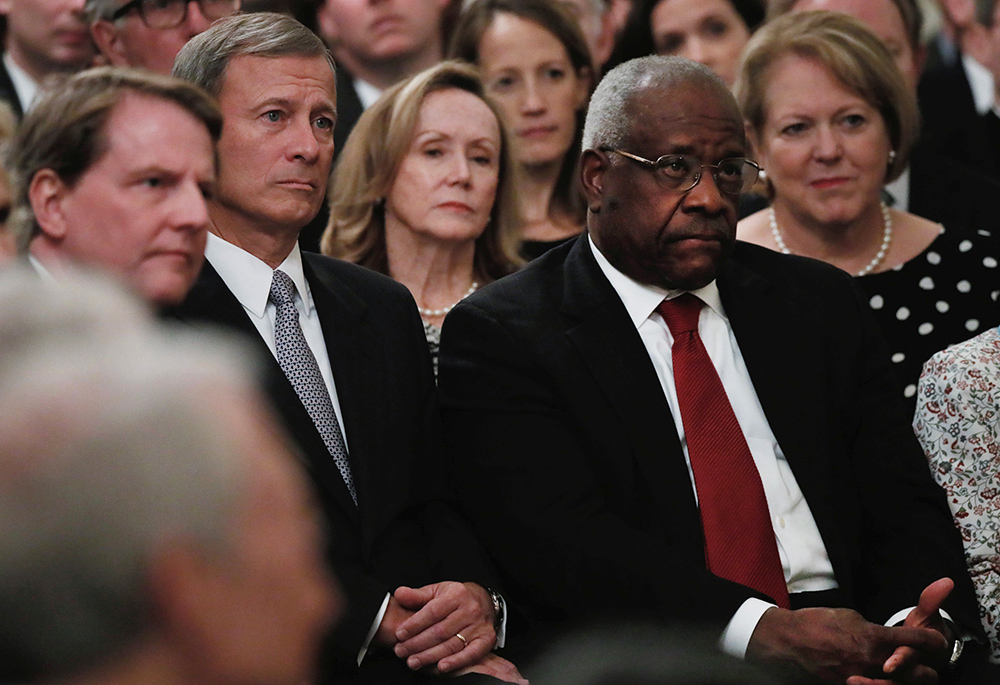
U.S. Supreme Court Justice Clarence Thomas delivers the 2021 Tocqueville Lecture Sept. 16 at the University of Notre Dame in Indiana. "We are all aware of those who assert that America is a racist and irredeemable nation," he said. "But there are many more of us, I think, who feel that America is not so broken as it is adrift at sea." (CNS/Peter Ringenberg, courtesy of University of Notre Dame)
ProPublica reported last week that Supreme Court Justice Clarence Thomas had received free trips from Dallas billionaire and Republican megadonor Harlan Crow. Among other examples of largess bestowed upon the justice, a 2019 trip to Indonesia with a private jet and a 162-foot yacht would have cost Thomas and his wife more than half a million dollars according to the report, but the trip was provided gratis by Crow.
Justice Thomas and Crow have both said there was nothing improper in the luxury gifts over the years. Thomas said in a statement, "As friends do, we have joined them on a number of family trips during the more than quarter century we have known them." He added: "Early in my tenure at the Court, I sought guidance from my colleagues and others in the judiciary, and was advised that this sort of personal hospitality from close personal friends, who did not have business before the Court, was not reportable." Crow said that he "never asked about a pending or lower court case, and Justice Thomas has never discussed one."
Well, then, I guess there is nothing to worry about!
Perhaps Crow really does prefer to discuss fishing for trout when he and Justice Thomas relax at the billionaire's exclusive retreat in the Adirondacks. A painting of the two with three other lawyers, featured in the ProPublica report, smells as fishy as the trout. There is Leonard Leo, who used his leadership at the Federalist Society to serve as the judicial casting director of the Trump administration, guaranteeing a shift to the right throughout the federal judiciary. I have a hard time believing he did not discuss legal matters and/or personnel with the group. Leo and Thomas are both prominent members of the influential D.C. conservative Catholic subculture.
Powerful people tend to get to know wealthy people. It is the price we Americans pay for not having publicly funded campaigns: To run for office, any office, you need to raise a boatload of money. Once elected, ethics committees oversee charges of undue influence on members of Congress, and every president has a White House counsel who guides members of the administration about what is legal or not.
One group of very powerful people in our nation's capital do not have to campaign for reelection every two, four or six years, and they are the nine justices of the U.S. Supreme Court. Their appointments are for life. Indeed, the whole point of giving them lifetime tenure is to inoculate them from the kinds of pressures mere politicians face. "Equal justice under law" is etched in marble above the entrance to the Supreme Court building in Washington. As far as one can see with the naked eye from street level, there is no small-print, qualifying adjective, no special clause permitting special treatment for those with yachts.
Advertisement
When justices take their seats on the high court, however, they are not elevated above the rest of the human race when it comes to ethics. We hope they are men and women of moral probity. It is true that for most of the nation's history, the justices of the U.S. Supreme Court shared the prejudices of their time and circumstance, from the first chief justice John Jay's pronounced anti-Catholicism to the racial bigotry of the first Catholic chief justice, Roger Taney. But the justices of the high court have been largely free from the kind of corruption often seen in the other political branches; there have been no Teapot Dome or Watergate-style scandals.
At a time when the court has been dragged, or catapulted itself, into the heart of contentious, partisan debates, it is especially important for the justices to be seen as beyond any outside, partisan influence.
Which is why the report about Thomas is so bracing. Thomas is not stupid. He knows that judges not only need to avoid any impropriety but must also avoid the appearance of any impropriety, defined at Law Insider as "conduct that reasonable minds, with knowledge of all the relevant circumstances, would perceive as materially impairing the judge's independence, integrity, impartiality, temperament, or fitness to fulfill the duties of judicial office." At a time when the court has been dragged, or catapulted itself, into the heart of contentious, partisan debates, it is especially important for the justices to be seen as beyond any outside, partisan influence.
Justice Thomas also knows that his wife Ginni's political involvement has raised red flags before about undue influence being brought to bear on him. Her testimony before the House Select Committee looking into the attack on the U.S. Capitol building on Jan. 6, 2021, was contradictory, saying at one point she had "no memory" of what she said to her husband while she was texting with Trump's White House chief of staff Mark Meadows, but also affirming, "I am certain I never spoke with him about any of the challenges to the 2020 election, as I was not involved in those challenges in any way." Which is it?

U.S. Supreme Court Chief Justice John Roberts, second from left, and Justice Clarence Thomas, both Catholic, listen during the public swearing-in ceremony for Justice Brett Kavanaugh Oct. 8, 2018, in the East Room of the White House in Washington. Kavanaugh, a Catholic, replaced Justice Anthony Kennedy, also a Catholic, who retired July 31, 2018. (CNS/Reuters/Jonathan Ernst)
The justices of the Supreme Court are, of course, exposed to a kind of political mendacity from the moment they are nominated. As I wrote at the start of the hearings for Justice Ketanji Brown Jackson in 2022, "To defeat a nominee, you need to find a personal scandal: It is considered bad form to oppose a supremely qualified nominee simply because you disagree with his or her judicial philosophy, when that should be the best and only reason to oppose a particular nominee." The nominees demur from answering any questions about specific issues. The whole thing is the kind of Kabukiesque farce that erodes trust in our judicial and political systems.
The chief justice of the United States, John Roberts, knows his first and foremost task is to protect the integrity of the courts. Surely, Roberts can see that Thomas' response to the ProPublica report was inadequate. Roberts knows, too, that the "personal hospitality" exemption to rules requiring justices to report gifts does not extend to flights on private jets or cruises on private superyachts.
Some critics of the court's recent, conservative decisions question the legitimacy of the court because they do not like the way it ruled. That is foolish and ridiculous. But, if Roberts wants to fend off those wrong-headed charges, he needs to make sure the justices are free from any ethical questions such as those raised by the ProPublica report. If he fails to act, it falls to Congress to pass laws requiring stricter ethical procedures at the Supreme Court.







